Land of the Dead?... – Tibetan Citipati
PRIMITIVE - Friday, October 31, 2014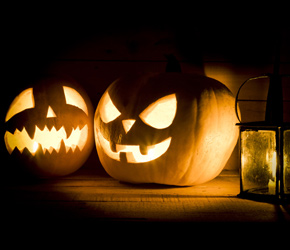 |
|
By Misaki Imagawa
PRIMITIVE’s chief restoration artist recalls the first time he landed in America. It was Halloween, October 31st 1992.
Imagine you are new to the United States. You have just arrived after a long, grueling flight from India and before that a seemingly endless trek from Tibet, your home country. October 31st means little to you because you have never heard of Halloween. It is already dark outside by the time you arrive, and you’re tired. You’ve barely slept. The anxiety of starting a new life has kept you awake. You get into a taxi, and as the cab makes its way to your destination, a supposedly quiet neighborhood in the suburbs where relatives reside, you start to notice something peculiar and slightly unsettling. White ghosts are peering out of windows so old and ill-kept that cobwebs are draped across them. Then you spot a skeleton crawling out of the ground. On one street, a zombie is lurching in your direction with its decayed arms outstretched, and at random houses on the street you see hordes of children dressed as demons in all shapes and sizes shouting and generally acting crazy. At a stop sign something out of nowhere bangs on your window. You jump, swinging around to find a grinning skeletal face pressed up against the glass, its boney hands tapping insistently on the window. “Trick or treat!” the creature shrieks. You don’t know whether to laugh or shriek yourself. What kind of a place is this? Is this really where you want to start a new life?
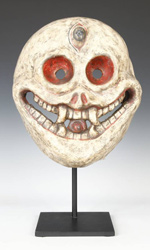 |
|
Skeletons, zombies and demonic figures all exist in Tibetan culture – except they’re not at all about fun, games, and especially candy. If there is anything mildly resembling Halloween ghosts and goblins in Tibet, it is the ro-langs, risen corpses, much like zombies. Ro-langs don’t come out at Halloween or any other specific time of the year. They can creep up on you anytime. In ancient Tibetan folklore, it is believed that evil spirits wander charnel grounds looking for vulnerable bodies that were not given proper funeral rites. Once they inhabit the corpse they become a serious and real threat.
There are many stories about ro-langs that old Tibetans tell to the young. Most chilling are tales of monks trying to destroy the risen corpses and being killed, or worse, turned into one of them. There are three types of ro-langs: bone, blood and “mole” ro-langs. The first two are easier to destroy by breaking their bones or cutting them open. The third is the most difficult because they are hard to locate. The one weakness ro-langs have is the inability to bend any of their joints. Consequently, they can't bend over. For that reason many older doorways in Tibet are low, as superstition dictates low doorways will keep ro-langs out of the house. On October 31st, not one piece of candy passes through these doors! Ro-langs are not to be fed!
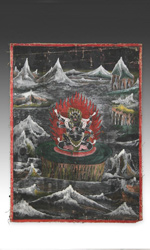 |
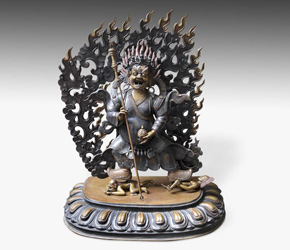 |
Seeing demonic figures at any point in time might be a cause for concern; however, some Tibetans believe demons can be seen during the transitional states between death and rebirth. These states are known as bardo. In the Tibetan Book of the Dead, one bardo is described where consciousness will see terrifying apparitions of hell and the sufferings of rebirth. Hungry ghosts are prominent. They are skeletal, emaciated figures who are constantly hungry, their stomachs bulging because their throat is only the size of a needle’s eye. There are also legions of wrathful deities, hideous and frightening, swarming consciousness with merciless threats of torture, maiming, disembowelment and slaughter. Imagine the success a haunted house would have with those kinds of scary elements.
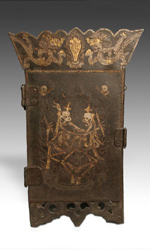 |
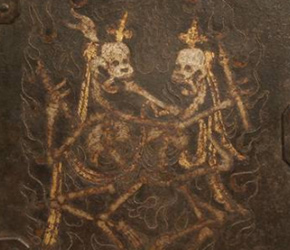 |
PRIMITIVE ID# A0901-054 |
|
In Tibetan Buddhism, the skeleton motif has great religious connotation; usually relating to the Citipati, a pair of skeletons. The story goes that the Citipati were once two monks who were so deep in their meditations they did not notice a thief stealing from them and cutting their heads off. Upon waking up, they discovered they were skeletons. Vowing eternal vengeance, the Citipati became wrathful deities - the sworn enemies of thieves and the protectors of the devout. The Citipati are also the guardians of the cemetery. It is believed they prowl cemeteries blowing the Tibetan long horn and performing a dance of life and death while keeping evil spirits from becoming ro-langs. As an aside, meditating in the cemetery is a sort of trial for monks who must conquer fear. After a successful night of meditating the monk’s soul will return to his body.
It appears that all cultures acknowledge ghosts, zombies, witches and demons with their own festivals of the dead. In Mexico there is the Day of the Dead; in China, the Hungry Ghost Festival; in the eastern Mediterranean there is the Thursday of the Dead; in Japan there is the Bon Festival; and of course, here in the US there is Halloween. Imagine arriving in any of these places on the particular day of such a festival with no prior knowledge of their unique customs or traditions. Our Chief Restorer did just that on October 31st 1992. It had to be a bit of a shocker seeing children in search of candy, all dressed up as ro-lang. He laughs about it now; but back then he must have wondered what kind of home he could create in this new land of demons and ghouls filled with candy, and of course, promise.
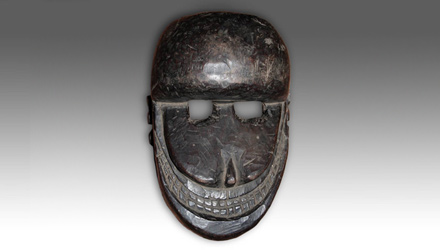 |
Download this Article: Land of the Dead.pdf